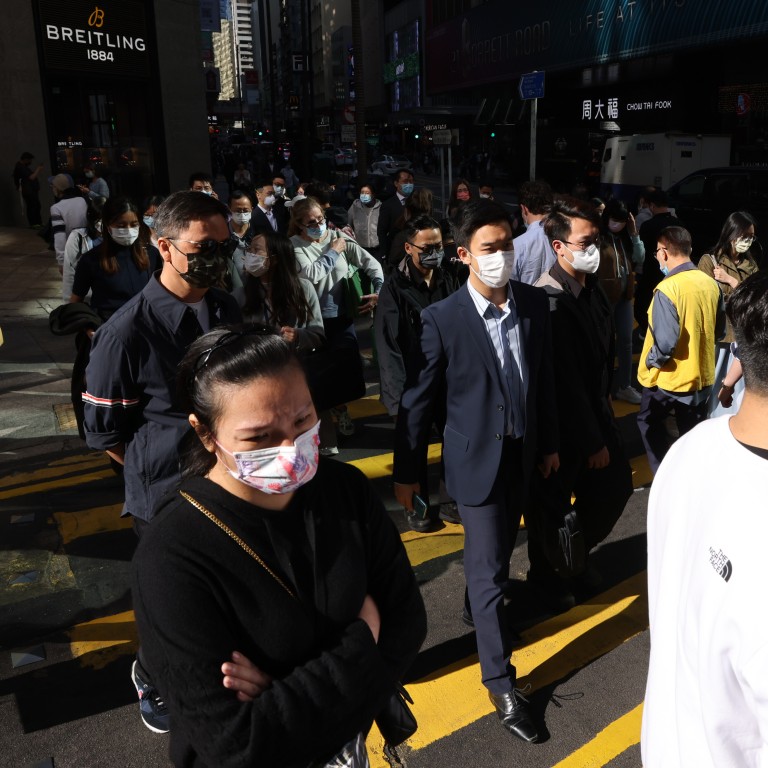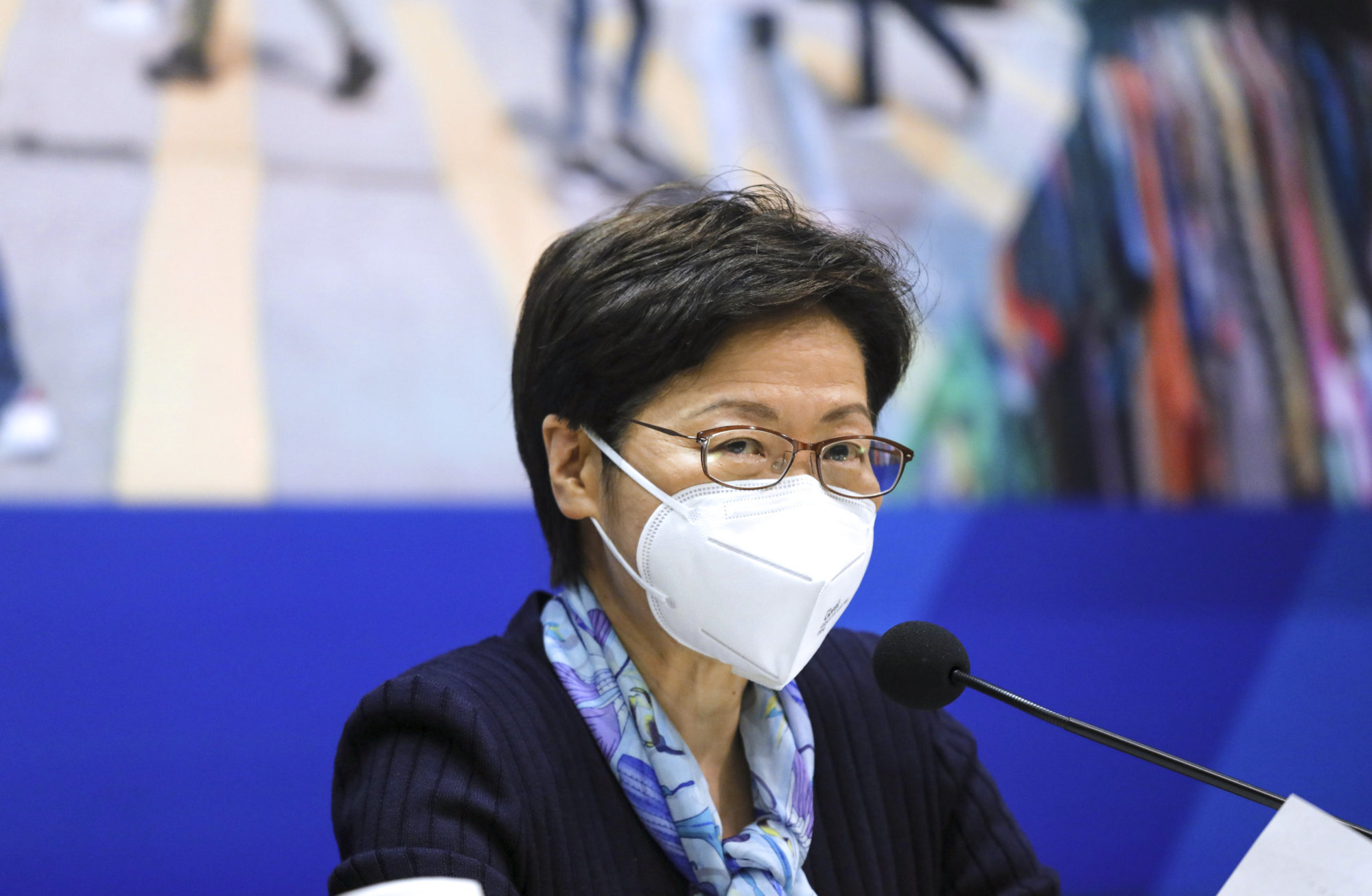
Coronavirus Hong Kong: relaunch of wage subsidy scheme will benefit up to 1.3 million workers affected by fifth wave, Carrie Lam says, as infections surpass 1 million
- City leader says new round of subsidies to help employers cover payroll but many larger companies excluded
- She also writes letter to business chambers seeking to reassure them about government’s plan to contain the fifth wave
Lam revealed the government would spend as much as HK$31 billion (US$4 billion) on wage assistance for between 1.1 million and 1.3 million employees under a relaunched Employment Support Scheme (ESS).
“We will adopt a more targeted approach this time, focusing on companies directly or indirectly affected by the fifth wave, especially small and medium-sized enterprises,” Lam said. “Chain supermarkets … and property management companies will be excluded.”

Her pledge coincided with a grim milestone for Hong Kong as the Centre for Health Protection reported another 20,082 cases, pushing the overall tally to more than 1 million infections, or one in every eight residents. Another 265 Covid-19 related fatalities were also confirmed, taking the total to 5,401.
The city’s aggressive regime of social-distancing rules has alarmed many companies and Lam sought to reassure them over the government’s plans in a letter she wrote to the International Business Committee, a group chaired by Chief Secretary John Lee Ka-chiu and made up of about 30 foreign and local chambers.
In the letter obtained by the Post, Lam said the government would reveal details of a universal screening operation in advance so the public would not be taken by surprise. She also addressed a long-awaited scheme allowing quarantine-free travel for international arrivals and people crossing the border, saying the government needed time to work out the arrangement. More immediately, the government would review the ban on flights from countries where Covid-19 was a severe threat, she added.
The latest ESS will offer HK$8,000 a month to each eligible worker for three months, which is less than the maximum HK$9,000 monthly payout for half a year under the previous round of the scheme in 2020 at a cost of HK$90 billion to taxpayers. Employees making more than HK$30,000 a month will not be eligible for the latest round of subsidies.
Lam suggested that the relaunched scheme would rely on information submitted as part of companies’ applications for 2020 round, although she did not offer details.
In a related development, the government announced details of a temporary jobless relief measure that would grant HK$10,000 to people laid off or suspended from work during the fifth wave. The measure is expected to benefit 300,000 unemployed people and cost HK$3 billion.
Hong Kong’s unemployment rate hit a five-month high of 4.5 per cent in December-February, compared with 3.9 per cent in November-January, an increase that Lam found “worrying”.
Hong Kong jobless rate hits five-month high of 4.5 per cent
“We have implemented the strictest social-distancing measures since January 7,” she said. “There has been no evening dine-in service, and more than a dozen types of premises have been shut down. You don’t need to see the figures to say that [unemployment in] January, February and March will worsen.”
Some business sectors that have not been heavily affected by the fifth wave will not be covered in the latest round of wage subsidies, including large supermarket and pharmacy chains, property management companies, banks and other financial institutions, delivery services and telecommunications firms.
Simon Wong Kit-lung, who runs 46 eateries with 1,000 workers under the LH Group, welcomed the relaunch of the ESS.
“We have been surrounded by complete darkness for months, with companies and people living in fear and anxiety. The new ESS gives us some hope,” said Wong, who is also the president of the Hong Kong Japanese Food and Cuisine Association.
But he added he felt the decision to base the new subsidies on businesses’ data from 2020 was misguided, saying information from just before the fifth wave should be used instead, arguing they were “two different worlds” as some firms grew and others contracted.
Federation of Trade Unions chairman Kingsley Wong Kwok also expressed support for the salary aid, saying: “This scheme is a necessary and timely one. But last time … the subsidy was capped at HK$9,000 per person, which was 50 per cent of the city’s median salary. As the median salary has increased since then, the government should at least show some consistency and keep the HK$9,000 level.”

Lam Chun-sing, chairman of the Federation of Hong Kong and Kowloon Labour Unions said he was worried the unemployment rate would eventually break the 7.2 per cent record set in February last year. He warned that more people would lose their jobs if authorities did not rein in the fifth wave by June.
“The difference now compared to last year is that many restaurants have now even closed down for the whole day due to the dine-in ban at night,” he told a radio programme.
He also urged the government to offer financial support to residents who were self-employed or underemployed, saying: “The government should focus social resources on helping those most in need.”
Speaking on the same programme, Professor Terence Chong Tai-leung, an economist at Chinese University, said returning business to normal levels was the key to lowering the unemployment rate.
One-fifth of Hong Kong gyms face closure under weight of strict coronavirus curbs
“The government’s subsidies and the consumption vouchers are of limited help,” he said, adding the money would not stop business owners from laying off workers if the wider economy did not recover.
He called on the government to consider relaxing anti-epidemic rules to allow some businesses to reopen.
Lam, meanwhile, was also asked whether she was concerned Hong Kong was at risk of losing its competitive edge due to brain drain amid a recent exodus of residents.
While acknowledging the city’s ageing population would further shrink the labour force, and that there was a need for new solutions to address severe understaffing in some sectors, Lam said she was optimistic Hong Kong would continue to draw in talent.
“Hong Kong is still a very attractive place,” she said. “I’m confident in Hong Kong. I believe those who have left will come back.”
Additional reporting by Tiffany Liang and Tony Cheung


